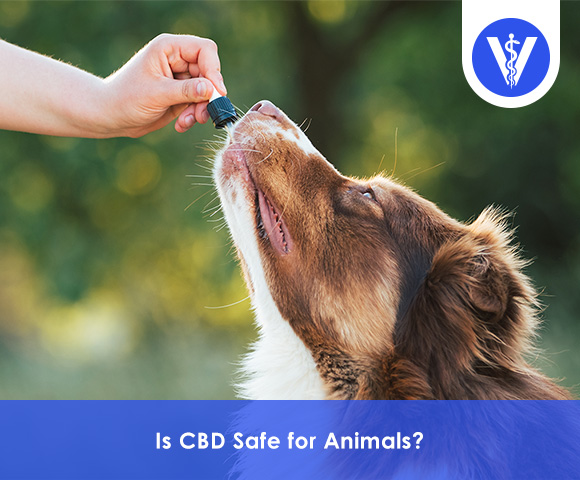Is CBD Safe for Animals?

Table of Contents
CBD for animals is safe. CBD products trigger side effects in some extra-sensitive pets. The CBD side effects in pets are usually benign, transient, and easy to manage through dosage modification.
Animal CBD is a natural compound sourced from hemp. Hemp cannabinoids (phytocannabinoids) interact with the endocannabinoid system, thus promoting health and balance.
Before using pet CBD, consult a veterinarian for advice on suitability, appropriate dosage, and potential interactions.
Are There Any Research Studies on the Safety of CBD for Animals?
Yes, there are studies on the safety of CBD for animals. An overview of some of the evidence is listed below.
- Frontiers in Veterinary Science conducted a study titled “Pharmacokinetics, Safety, and Clinical Efficacy of Cannabidiol Treatment in Osteoarthritic Dogs” in 2018. The results showed “no side effects” following the use of dog CBD oil.
- The Scientific Report study “A Report of Adverse Effects Associated With the Administration of Cannabidiol in Healthy Dogs” concluded that CBD was “well tolerated in dogs” the same year.
- The National Center for Biotechnology Information published a study, “Single-Dose Pharmacokinetics and Preliminary Safety Assessment with Use of CBD-Rich Hemp Nutraceutical in Healthy Dogs and Cats,” 2019. The study showed that “CBD-rich hemp nutraceuticals appear to be safe in healthy adult dogs, while more work in cats is needed to fully understand utility and absorption.”
- The National Center for Biotechnology Information, in a study, “Preliminary Investigation of the Safety of Escalating Cannabinoid Doses in Healthy Dogs,” in 2020, reported that “dogs tolerated dose escalation of the CBD oil well.”
- Frontiers in Veterinary Science published a study titled “Long-term daily feeding of cannabidiol is well-tolerated by healthy dogs” in 2022. The study found that CBD is “well tolerated in clinically healthy dogs for a duration of 6 months.”
- The Annual Reviews of Animal Biosciences conducted a study, “Scientific Validation of Cannabidiol for Management of Dog and Cat Diseases,” in 2023. The results showed that “CBD appears to have good bioavailability and safety profile with few side effects.”
Do Veterinarians Recommend Using CBD for Animals?
No. Veterinarians are not able to legally recommend CBD for pets. As CBD laws regarding use in animals relax, veterinarians gain more freedom to discuss the topic.
There are, however, many legal ambiguities. The 2018 Farm Bill does not say anything specific about the veterinary use of cannabis products.

The rules regarding pet CBD vary among states. For example, a specific bill in California allows vets to discuss CBD as long as they do not recommend cannabis use.
Integrative and complementary veterinarians are familiar with alternative treatments and CBD benefits and can answer pet owner questions.
Clinical research on CBD for animals is ongoing. Many veterinarians still want more scientific evidence before taking a personal stand about pet CBD veterinary opinions vary.
How is it Used in Animals?
CBD for animals is used mainly in two forms: Oils and treats. There are pet CBD capsules, powders, patches, and topicals, but oils and edibles are the most popular options.
Understanding what is CBD for animals helps explain its use. CBD is a hemp-extracted product containing active and health-boosting ingredients called cannabinoids (CBDs).
The cannabinoids interact with the endocannabinoid system (ECS). The ECS is present in all mammals and responsible for almost all vital body functions.
What Dose is Recommended for Using CBD in Animals?
The recommended CBD dose for animals is 1 to 5 milligrams per 10 pounds or 0.001 to 0.005 milliliters per 4.53 kilograms of body weight. It is best to start with a lower amount and gradually increase it if necessary.
The gradual increase allows the pet to adjust to the hemp CBD supplement and reduces the risk of side effects. Giving animals too much CBD by mistake is not a cause for concern. High-quality, pure CBD does not cause overdoses in pets.
Which Situations Can CBD Be Used on Animals?
Listed below are the uses of CBD in animals.
- Osteoarthritis: Pet CBD reduces pain and improves mobility in pets with osteoarthritis. CBD reduces the dosage of non-steroidal anti-inflammatory drugs (NSAIDs) known to cause serious side effects.
- Seizures: CBD for pets helps decrease the incidence of epileptic seizures. In one study, CBD reduced seizure frequency in 89% of dogs.
- Allergies: CBD helps with allergies by modulating the immune system and reducing inflammation. It reduces itchiness and is beneficial to dogs with atopic dermatitis.
- Cancer: CBD for animals helps destroy cancer cells, shrinks tumors, and prevents metastasis. CBD boosts the effects of chemotherapy and helps reduce its main side effect, nausea.
- Behavioral Issues: Pet CBD products alter how the brain responds to serotonin, thus promoting calmness and relaxation. These features are beneficial in situations when animals are hyperactive or anxious. CBD helps dogs with noise phobias.
When is CBD Not Recommended for Animals?
CBD for pets is not recommended in four situations: allergies, young puppies, unmanageable side effects, and around surgeries.
Animal CBD supplements are not safe for pets allergic to or sensitive to cannabidiol or the carrier oil used within the product. CBD is unsafe for young puppies less than four months old, too.
Discontinue the use of CBD in animals experiencing severe side effects. Try modifying the dose, but it is best to stop giving CBD oil or treats altogether if that does not work.
CBD has an anticoagulant effect, meaning it increases bleeding. Typically, this is not an issue, but it is problematic in pets undergoing surgeries. Stop supplementing with CBD for a few days before and after the procedure.
Which Animals Can Consume CBD?
Animals that can consume CBD are listed below.
- Dogs: Pet CBD is common in canines for various physical and behavioral conditions.
- Cats: Pet cats benefit from CBD products. CBD is safe for cats when used responsibly.
- Horses: Animal CBD is well-accepted in adult horses and helps to manage issues like anxiety and arthritis.
- Rodents: Pet CBD suits rodents such as rabbits, hamsters, rats, mice, and guinea pigs.
- Ferrets: Anecdotal evidence and individual experience demonstrate the safety of CBD products for ferrets.
- Snakes: CBD is safe and beneficial for reptiles and pet snakes.
- Aquarium Fishes: Animal CBD improves fish mobility, behavior, and immunity.
What Animal Species Are More Sensitive Against CBD?
Listed below are some animal species that are more sensitive to CBD.
- Dogs: Dogs have a higher number of receptors compared to other animals and humans. Dogs are more sensitive to CBD products due to the higher number of receptors.
- Cats: Cats have fewer cannabinoid receptors than dogs. Therefore, they absorb and utilize CBD more slowly.
What are the Effects of CBD on Animals?
Listed below are the effects of CBD on animals.
- Reduced Inflammation: Pet CBD has potent anti-inflammatory features. Plus, full-spectrum hemp products are rich in omega fatty acids, which help reduce inflammation.
- Decreased Pain: CBD works on several levels and helps with acute episodes and chronic pain, like neuropathic and osteoarthritic pain.
- Antioxidant Effects: CBD is a potent antioxidant. Its antioxidant features are 30-50% more powerful than vitamins C and E.
- Anxiety Control: CBD for animals has anxiolytic and panicolytic effects. It supports calmness, relaxation, and better sleep.
- Increased Appetite: Animal CBD improves appetite and reduces nausea and vomiting.
- Immune Boost: Pet CBD modulates the immune system, thus promoting a more robust immune response to potentially harmful agents.
What are the Benefits of Using CBD on Animals?
Listed below are the benefits of CBD to pets.
- Natural Supplement: Derived from the hemp plant, CBD for pets is safe. CBD is a natural alternative to mainstream medications.
- Low Side Effects: Pet CBD rarely causes side effects. Sensitive pets are prone to side effects but are usually mild and easy to manage.
- Wide Application: CBD for animals is suitable for ailments like pain, inflammation, anxiety, lack of appetite, seizures, etc.
- Readily Available: Pet CBD products are easy to obtain. In the United States, they do not require a veterinary prescription.
- Simple to Use: CBD products for pets come in many forms, making dosage and administration straightforward. The ease of use is one of the main benefits of CBD to animals.
What are the Side Effects of CBD on Animals?
Listed and explained below are the pet CBD side effects.
- Dry Mouth: CBD decreases saliva production, which results in a dry mouth (xerostomia).
- Vomiting: Vomiting results from the CBD content, the bitter flavor, or the carrier oil.
- Diarrhea: The carrier oil in the animal CBD product may cause diarrhea.
- Stomach Upset: CBD can potentially irritate the pet’s sensitive stomach, triggering bouts of vomiting and diarrhea.
- Lowered Blood Pressure: CBD causes a blood pressure drop, which is temporary and dose-dependent.
- Dizziness: The lowered blood pressure manifests with light-headedness or dizziness, and your pet may have issues with balance or fall.
- Lethargy: CBD makes pets feel overly relaxed or lethargic (less active than usual) if given in large doses.
- Decreased Liver Enzymes: CBD blocks the production of liver enzymes, affecting certain medications’ metabolism.
- Increased Tremors: CBD increases the severity of tremors in rare cases.
- Itchiness: CBD is linked to increased itching (scratching and biting) when given in large doses.
Pet owners are interested in the side effects of CBD to animals. CBD side effects are possible but rare and easy to manage.
Can CBD Interact with Other Medications in Animals?
Yes. Pet CBD interacts with other medications, supplements, and herbal remedies, such as certain antibiotics, opioids, anesthetics, warfarin, anti-epileptic drugs, hormones, etc.
CBD for animals has an indirect effect on medications. CBD increases the potency of some drugs by inhibiting the production of liver enzymes.

The fact that CBD interacts with particular medications does not preclude using CBD simultaneously. Some drug interactions are helpful. For example, osteoarthritic dogs supplemented with CBD require lower doses of NSAIDs to experience significant pain relief. CBD boosts the anti-cancer effects of vincristine in dogs receiving chemotherapy.
Always consult a licensed veterinarian before using a CBD product on your pet.
How can CBD for Animals Be Produced?
CBD for animals is produced from hemp. Hemp is rich in healthy cannabidiol (CBD) and low in tetrahydrocannabinol (THC), which is toxic to pets. THC is found in marijuana and makes users “high.”
When buying CBD products for animals, ensure the CBD is sourced from organic hemp and contains less than 0.3% of THC.
A full-spectrum CBD is recommended for your pet. Check the cannabinoid profile, as CBD products are available as full-spectrum, broad-spectrum, and isolate.
Full-spectrum is the best as it contains flavonoids, terpenes, and omegas that boost the CBD’s effects.
Ensure the pet CBD product has a Certificate of Analysis (COA). An independent laboratory issues the COA after testing the supplements and confirming the CBD ingredients and concentrations.
Many brands offer CBD for animals in the modern pet market. Choose a reputable brand. Read customer reviews to get an insight into the brand’s transparency and trustworthiness.
What is the Legal Status of Using CBD in Animals?
Hemp CBD for animals is legal in the United States. The United States Federal Government de-scheduled hemp (removed hemp from the list of controlled substances in the Controlled Substances Act) via the Farm Bill in 2018.
Pet CBD products are federally legal to produce and sell as long as they contain less than 0.3% of THC, and the labels advertise “supplements.”
The Association of American Feed Control Officials (AAFCO) says hemp cannot be used as a pet food ingredient.
The Food and Drug Administration (FDA) does not approve the use of CBD in animals. The FDA classifies CBD as an “unapproved new animal drug.”
Veterinarians are not able to legally recommend and prescribe CBD for animals.
What Is the Cost of Using CBD in Animals?
High-quality CBD for animals is expensive. In the United States, full-spectrum hemp CBD products typically cost between 10 and 13 cents per milligram of CBD content.
CBD is dosed on a “per pound” basis, meaning large animals need higher doses, equating to USD 4 per day for a large dog.
A WoofWhiskers survey showed dog owners spend USD 42 monthly on CBD products. The monthly cost of CBD products for a large dog is close to the national average for monthly dog food expenses.
The exact price of an animal CBD product varies based on hemp quality (organic or regular), number of active ingredients (cannabinoids), extraction method, and potency.
With many brands offering pet CBD today, finding an affordable CBD for animals without compromising quality is easier than ever.
Stomach issues and light-headedness are among the most common side effects of pet CBD products. CBD is linked with certain side effects, like all supplements.
















